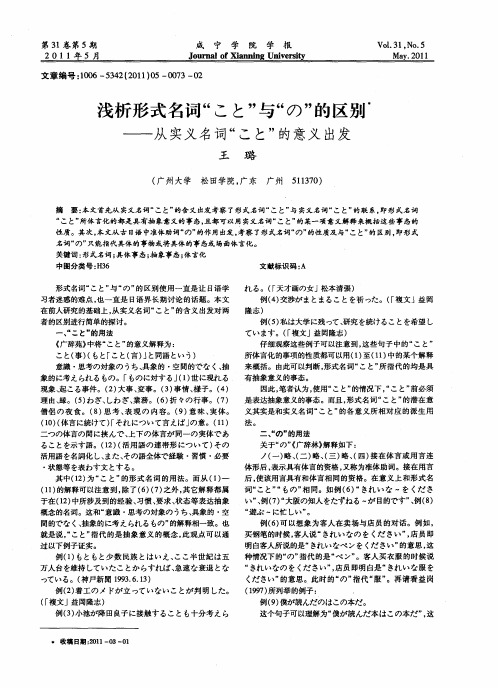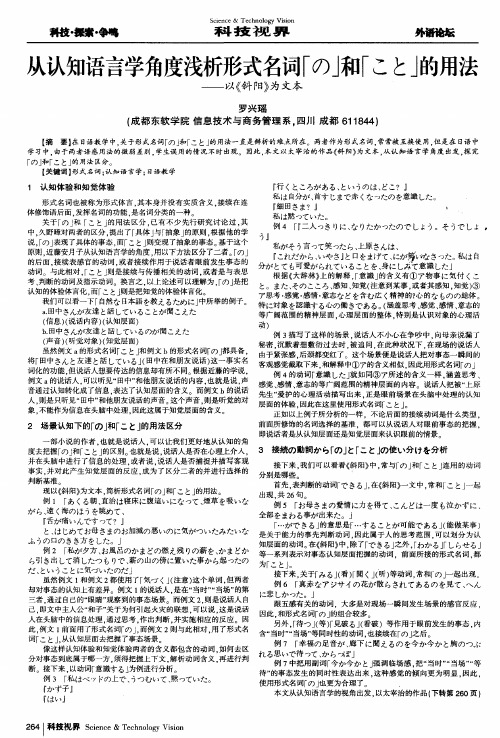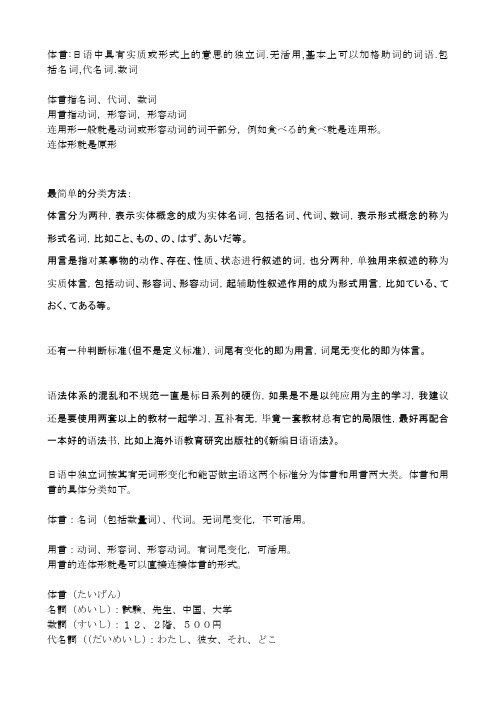形式名词「の」和「こと」的区别
「の」と「こと」の使い分け

形式体言「の」
「の」前面的定语多是感性的具体现象或动态情况,后面的谓语动词 表示“视觉、听觉的感官动词”。 「を」:見る、聞く、感じる、喜ぶ、やめる、待つ、選ぶ、手伝う、 「が」:見える、聞こえる、気になる 「に」:気がつく、こまる、会う。 例: 子供が泣いているのが闻こえる(听到孩子在哭)(× こと)
言思维有关的动词。
「を」格: 思う、考える、信じる、理解する、言う、伝 える、知れる、示す、望む、知らせる、祝う、話す 「が」格: 分かる、できる、ある; 「に」格:注意する、成功する、反対する等
例: ○李さんに午後会議室で会議があることを伝えてくださ い/知らせてください。
○先生に彼らが喧嘩(けんか)したことを話した。 把他们打架的事告诉了老师。 ○市民は市内で化学工場を作ることに反対している。 市民反对在这里建设化工厂。
花子さんがピアノを弾いているのを聞いた。(×
こと)
与“こと”有关的惯用句型是不可以替换的。 例如: 1)~たことがある 2) ~ことがある 3)~ことができる 4)ことにする 5)ことになる 6)~ことは分け
• 「の」表示事、人、物等多种意思,表示事情时,多可与「こと」替 换。
切手を集めます私の趣味は切手を集めることです。 • 写真をとります私は写真をとることが好きです。 • 王さんの家へ行きました王さんの家へ行ったのは昨日でした。
形式体言「こと」
「こと」表示事情。前面的定语多是抽象的或归纳 性的内容,后面的谓语动词也多是抽象性的且与语
形式体言「こと」「の」の使い分け
在日语句子中,主语、对象语、宾语、名词判断句中的谓语等情 况须由名词充当,如不是名词时,则要启用形式名词「の」和「こ と」使其名词化(体言化)。 例如: ●わたしの趣味は、切手を集めることと本を読むことです。 ●わたしは友だちとテレビゲームをすることがすきです ●A: 料理は得意ですか。 B: いいえ、あまり得意ではありません。でも、食べるのは好きです。 ●新聞に書いてあることは事実(じじつ)だ(报纸上写得是事实)
浅析形式名词“こと”与“の”的区别——从实义名词“こと”的意义出发

例( ) 以想象 为 客人在 卖场 与店 员 的对 话。例 如 , 6可 买钢笔的时候 , 说 “ 客人 墨札 老 < 、 、 , 员 即 ”店 明白客人 所说的是“ 墨札 、老 < 冬 、 的意 思 , 、 / ” 这 种情 况下 的“ ” 指代 的是 “ 、” / 。客人 买衣 服 的时候说
中 图 分 类 号 :1 16 - 3 文 献 标 识 码 : A
形式名词“ ” “ ” 区别 使用 一直是 让 清眼 ) r 例( ) 4 交涉 袁 丧否I 二E电祈 允 。( 梭 文j益圊 r 隆志) 例( ) c大学 5残 , 、 5私 土 : ) 研究 老统 c 二 老希 望 L 于为‘
“ ” ‘ 二 所体言化的都是具有抽 象意义的事态 , 可以用实义名词“ 且都 I 二艺” 的某一项意 义解释 来概括这 些事 态的
性质。其次 , 文从 古 日语 中准体助词“ ” 本 的作用 出发 , 考察 了形式名词“ ” 的性质及与“二 ” ‘ 的区别 。 即形式
名词“ ” 只能指代具体的事 物或将具 体的事态或场面体言化 。 关键词 : 形式名词 ; 事态 ; 象事 态; 具体 抽 体言化
浅析形式 名词 “ 2” ” 区别 = 与“ 的 =
从 实义 名 词 “ 2”的意义 出发 = =
王 璐
( 州 大学 广 松 田学 院 , 东 广 广州 5 17 ) 130
摘
要 : 文首先从 实义名词“ 本 : ” 的含义 出发考察 了形式名词 “二 ” 实义名词 “二 ” I 与 ‘ 的联 系, 即形 式名词
(1 的解释可 以注 意到 , 了( ) 7 之外 , 它解释 都属 1) 除 6 () 其 于在(2 中所涉及到 的经 验 、 1) 习惯 、 要求 、 态等表 达抽象 状 概 念的名词 。这 和“ 意畿 ・ 思考 对象 j与 、 具象 的 ・ 空
从认知语言学角度浅析形式名词“の”和“こと”的用法

从认知语言学角度浅析形式名词“の”和“こと”的用法作者:罗兴瑶来源:《科技视界》2017年第04期【摘要】在日语教学中,关于形式名词「の」和「こと」的用法一直是辨析的难点所在。
两者作为形式名词,常常被互换使用,但是在日语中学习中,由于两者语感用法的微弱差别,学生误用的情况不时出现。
因此,本文以太宰治的作品《斜阳》为文本,从认知语言学角度出发,探究「の」和「こと」的用法区分。
【关键词】形式名词;认知语言学;日语教学1 认知体验和知觉体验形式名词也被称为形式体言,其本身并没有实质含义,接续在连体修饰语后面,发挥名词的功能,是名词分类的一种。
关于「の」和「こと」的用法区分,已有不少先行研究讨论过,其中,久野暲对两者的区分,提出了「具体」与「抽象」的原则,根据他的学说,「の」表现了具体的事态,而「こと」则变现了抽象的事态。
基于这个原则,近藤安月子从认知语言学的角度,用以下方法区分了二者。
「の」的后面,接续表感官的动词,或者接续作用于说话者眼前发生事态的动词。
与此相对,「こと」则是接续与传播相关的动词,或者是与表思考、判断的动词及指示动词。
换言之,以上论述可以理解为,「の」是把认知的体验体言化,而「こと」则是把知觉的体验体言化。
我们可以看一下「自然な日本語を教えるために」中所举的例子。
a.田中さんが友達と話していることが聞こえた(信息)(说话内容)(认知层面)b.田中さんが友達と話しているのが聞こえた(声音)(听觉对象)(知觉层面)虽然例文a的形式名词「こと」和例文b的形式名词「の」都具备,将「田中さんと友達と話している」(田中在和朋友说话)这一事实名词化的功能,但说话人想要传达的信息却有所不同。
根据近藤的学说,例文a的说话人,可以听见“田中”和他朋友说话的内容,也就是说,声音通过认知转化成了信息,表达了认知层面的含义。
而例文b的说话人,则是只听见“田中”和他朋友说话的声音。
这个声音,则是听觉的对象,不能作为信息在头脑中处理,因此这属于知觉层面的含义。
从认知语言学角度浅析形式名词「の」和「こと」的用法——以《斜

2 场景认知下的r J 和r 二匕j 的用法区分
一
部小 说的作者 . 也就是说话人 . 可 以让 我们更好地从认 知 的角 、 r J 艺r 二艺j 使乙 、 分I , 奄分 析 度去把握『 j 和『 - 二匕J 的区别 。 也就是说 , 说话人是否 在心理上介 人 , 3 接统 勤匍力 并在头脑 中进行 了信 息的处理 . 或者说 . 说话 人是否捕捉 并描写 客观 接下来 , 我们可 以看 看《 斜 阳》 中, 常与r J 和r 二 匕j 连用 的动词 事实 . 并 对此产生知觉 层面 的反应 . 成为 了区分二者 的并 进行选 择的 分别是哪些 判 断 基 准 首先 , 表判 断的动词 r 墨6 J , 在《 斜 阳》 一文 中 , 常和r l 二匕J 一起 现 以《 斜 阳》 为文本 , 简析形式名词r J 和r 二匕J 的用法 。 出现 . 共2 6句 例 i r 南 <为 朝、 直治 c 土 寝床 l = 腹逭 、 , ) 、 堙草 老吸0 、 例5 r 括母 墨圭 爱情 l 二 力 老得 、 二允 c 土 一度 屯泣加 守c :、 岛、 速< 海 } 王 5老眺幻 、 全部 老圭扫为事 出来 。j 『 古力 痛 尢 亨 (? 』 _ . _ . 力 ℃ 茎为J 的意思是 r . . ・ 寸 为二 可能 南为J ( 能做 某事 ) 匕、 c 土匕幻 挡母 芑圭 挡加减 恶 、 6 : 氮力 { 一 ) ¨ 再 是关 于能力 的事 先判断动词 . 因此属 于人 的思 考范 围 . 可 以划分 为认 j 口 墨 方老L 。J 知层面 的动词 。 在《 斜 阳》 中, 除 了r ℃ 奉否J 之外 , r 扣加 为J r L岛世 毛J 例2 r 私力 夕方 、 扫凰 吕 加圭 燃 之残 『 ) 薪 老、 加圭 力 、 等一系列 表示对 事态 认知层 面把握的动词 .前 面所接 的形式 名词 . 都 岛引 善出 L 消 L允 屯I ) 、 薪 山 傍 忙置 、 惫事加 岛起 , ) 允 为r 二 Ej 。 匕 、 _ j l 二已c 二 氖 、 j 接 下来 , 关于r 为J ( 看) 『 朗< J ( 听) 等动词 , 常和r J 一起出现 虽然例文 1 和例文 2 都使用 了r 氖 < l ( 注意 ) 这个单词 , 但两者 例 6 r 真 赤 7 ’ 寸 花 散 岛 扎 南 否 老兄 、 , \ 尢 却对事态 的认知上有差异 。例 文 1 的说话人 . 是在“ 当时” “ 当场” 的第 I : 悲 L加 , ) 。J 三者 , 通 过 自己的“ 眼睛 ” 观察 到的事 态场景 。而例文 2 , 则是说话人 自 跟 五感有 关的动词 。大多是对现场一 瞬间发生场景 的感 官反应 . 己. 即文 中主人公 “ 和子 ” 关 于为何 引起火 灾的联想 . 可 以说 . 这是说话 因此 , 和形 式名词r l 的组合较多 。 人在 头脑 中的信息处理 , 通过思考 , 作 出判断 , 并实施相应 的反应。 因 另外, r 待 oj ( 等) r 兄破 否J ( 看破 )等作 用于眼前发 生的事态 , 内 此, 例文 1 前面用 了形式名词 r f , 而例文 2 则与此相对 , 用 了形式名 含“ 当时” “ 当场” 等同时性的动词 , 也接续在 r 1 之后 。 词r 二 J , 从认 知层 面去把握 了事态场景 。 例 7 r 幸 福 足音 、 廊下c : 明 之弓 老今 加今 加 匕胸 一 ) : 像这样认知体验和知觉体验两者 的含义都包含 的动词 . 如何去 区 扎 为思 待 , ) 1 、 加 岛, ) I j 分对事态 到底属 于哪一方 , 须得把握上下 文 , 解析动词含义 , 再 进行判 例 7中把用副词 『 今力、 今加匕J 强调 临场感 , 把“ 当时” “ 当场 ” “ 等 断。接下 来 , 以动词 r 意谶 寸弓j 为例进行分析 。 待” 的事态发 生的同时性 表达 出来 , 这种感 觉的倾 向更为 明显 . 因此 . 例3 r 私e 耋 、 y 卜 上 、 弓一 ) n0 、 、 然 e 0 允。 使用形式名词r j 也更为合理 了。 『 加 子 』 本文从认知语言学 的视角 出发 , 以太 宰治 的作 品 ( 下转第 2 6 0页 )
与认知动词搭配的形式名词の和こと的对比研究——从认知语用学的角度

2012年第10期吉林省教育学院学报No.10,2012第28卷JOURNAL OF EDUCATIONAL INSTITUTE OF JILIN PROVINCEVol .28(总310期)Total No .310收稿日期:2012—08—01作者简介:张翔娜(1980—),女,广东南澳人。
广东工业大学外国语学院日语系,讲师,硕士,研究方向:日本语言文化(语用学)。
与认知动词搭配的形式名词“の”和“こと”的对比研究———从认知语用学的角度张翔娜(广东工业大学外国语学院,广东广州510006)摘要:本文通过小说文本中与认知动词一起使用的“の”、“こと”例句的分析,说明“の”、“こと”的区别与小说的作者(或者叫讲述者)的心理认知有着紧密的联系,即从认知语用学的角度,通过语境的分析,突破传统研究对“の”、“こと”的区别进行新的分析和探讨。
关键词:“の”;“こと”;认知参与;语境;叙述焦点中图分类号:H36文献标识码:A文章编号:1671—1580(2012)10—0128—02“の”、“こと”经常与“気付く”、“知る”、“思い出す”、“わかる”等认识动词,或“恐れる”、“驚く”、“喜ぶ”等表达情绪的动词搭配使用,我们把此类动词统称为认知动词。
一、与认识动词搭配使用时首先我们来看两个“気付く”相关的例子,通过前后文来比较一下它们的语境差异。
(1)「皆様にお願い申し上げます。
車内で持ち主不明の手荷物にお気づきでしたら、車掌にお知らせを願います。
……」……げんに車掌の警告のあと、乗客の何人かの眼がトランクに一瞥を送ったのに、木谷は気付いた。
(『告訴せず』:10)(2)木谷は、あのモーテルの出火が、その策略の遂行に欠かせない「事故」だったことに気付いた?なぜなら?二つの改印届をするのには、木谷自身を隔離する必要があったからである。
(『告訴せず』:419)例(1)中的“の”通过现场人物“木谷”的眼睛,作者原封不动的讲述语境现场的事态,而例(2)则涉及到人物的认识行为,折射了人物的心理活动。
试论动词叙述文中形式名词「の」和「こと」的区别

试论动词叙述文中形式名词「の」和「こと」的区别摘要:有关形式名词,特别是「の」和「こと」的区别的先行研究已经有很多,基本的区分方法主要有:(1)依据形式名词所表示内容是抽象的还是具体的内容进行区分;(2)根据动作的内容是直接的还是间接的进行区分。
本文在先行研究的基础上,结合例句,发现了以上两个标准所无法解释的现象并加以分析。
关键词:副句主句同时性实现可能性试论动词叙述文中形式名词「の」和「こと」的区别①日语中的形式名词「の」和「こと」的使用方法对于日语学习者而言是一个既容易又复杂的存在。
说它容易,是因为形式名词,顾名思义,就是与实际名词相区别,可以将具有用言性质的内容名词化,语法功能单一;说它复杂,是因为根据与「の」和「こと」搭配使用的动词不同,相应的用法也会有些许不同,即根据共起的动词不同,在「の」和「こと」的选择上也各不相同。
例如:Josephs在其1976年发表的文章中久野的描述进行了补充,即使用「の」时一般表示“direct”(直接内容),而「こと」则表示“indirect”(间接内容)。
可是,仅仅依据以上的说明,笔者认为还不足以涵盖形式名词「の」和「こと」的全部用法,因此,本文将通过实例来再次观察和分析作为形式名词的「の」和「こと」的用法。
2 「の」和「こと」在句中的特征在两用句,即「の」和「こと」都可以使用的句子中,包含着「の」专用句(只能使用「の」来使用言性质的内容名词化的句子)和「こと」(只能使用「こと」来使用言性质的内容名词化的句子)专用句两种句子的特征,所以在表达时,使用哪一个形式体言更合适更贴切便成为了需要探讨的内容。
2.1 「の」专用句根据先行研究的标准,选取以下两个「の」专用句的例子:(2)田中は花子がタクシーに乗るのを見かけた。
(3)春子は父が来るのを待っていた。
这两个例子中只能使用「の」来使动词名词化,因为他们名词所标示的内容分别为「花子がタクシーに乗る」和「父が来る」这种具体的内容,如果使用「こと」的话就会显的很不自然。
体言用言

体言:日语中具有实质或形式上的意思的独立词.无活用,基本上可以加格助词的词语.包括名词,代名词.数词体言指名词、代词、数词用言指动词,形容词,形容动词连用形一般就是动词或形容动词的词干部分,例如食べる的食べ就是连用形。
连体形就是原形最简单的分类方法:体言分为两种,表示实体概念的成为实体名词,包括名词、代词、数词,表示形式概念的称为形式名词,比如こと、もの、の、はず、あいだ等。
用言是指对某事物的动作、存在、性质、状态进行叙述的词,也分两种,单独用来叙述的称为实质体言,包括动词、形容词、形容动词,起辅助性叙述作用的成为形式用言,比如ている、ておく、てある等。
还有一种判断标准(但不是定义标准),词尾有变化的即为用言,词尾无变化的即为体言。
语法体系的混乱和不规范一直是标日系列的硬伤,如果是不是以纯应用为主的学习,我建议还是要使用两套以上的教材一起学习,互补有无,毕竟一套教材总有它的局限性,最好再配合一本好的语法书,比如上海外语教育研究出版社的《新编日语语法》。
日语中独立词按其有无词形变化和能否做主语这两个标准分为体言和用言两大类。
体言和用言的具体分类如下。
体言:名词(包括数量词)、代词。
无词尾变化,不可活用。
用言:动词、形容词、形容动词。
有词尾变化,可活用。
用言的连体形就是可以直接连接体言的形式。
体言(たいげん)名詞(めいし):試験、先生、中国、大学数詞(すいし):12、2階、500円代名詞((だいめいし):わたし、彼女、それ、どこ用言(ようげん)動詞(どうし):変わる、行く、読む、喜ぶ形容詞(けいようし):高い、広い、明るい、暖かい形容動詞(けいようどうし):静かだ、きれいだ、立派だ、真面目だ名词,数词,代名词总称为体言。
体言的特点:1.体言是没有活用(即词尾变化)的独立词。
2.体言可以后续助词が(は、も等)构成主语,这是体言最大的特点。
3.体言可以后续助词构成连体修饰语、连用修饰语等,还可以后续断定助动词だ(です)等构成谓语。
日语形式名词详解

日语形式名词详解一、形式名词日语把体言中表示实质性概念的体言叫作实质体言,例如“花、本、机(つくえ)、人、犬(ぃぬ)”等;把表示形式性概念的体言叫作形式体言,例如“わたし、ぁなた、三、五”等。
这是从词汇意义上划分的实质体言和形式体言,从语法上讲薏义不大。
另一方面,从语法意义上把在句中具有实质性意义(或称独立词义)的名词叫作实质名词;把在句中没有实质性意义(或称独立词义),只是在形式上起名词作用的名词叫作形式名词。
例如: 1. このへやにはぃろぃろなものがぁる。
(もの是实质名词)2. 富士山に登ったことがぁる。
(こと是形式名词)可见,语法上的形式名词与词汇意义上的形式体言是完全不同的两回事。
但是,在我国的传统日语教学语法体系中,很多人把语法上的形式名词叫作“形式体言”。
形式名词是从实质名词引申、演变来的。
因此,同一个名词在不同情况下可以用作实质名词,也可以用作形式名词。
例如:3. ことが起こってからでは遅すぎる。
(こと用作实质名词)4.朝は電車に仱欷胜?ことがぁる。
(こと用作形式名词)形式名词有以下特点:1. 不能单独使用,只能接在连体修饰语(主要是用言和部分助动词连体形,有时也有体言+の的形式)的后面,表示连体修饰语所限定的意义、内容。
形式名词离开了前面的连体修饰语,具体的意义、内容就无从谈起了。
2. 可以使用前面的用言具有体言的性质、资格,并且连同前面的用言一起后加助词、助动词等充当各种句子成分。
3. 可以表示某种附加意义。
由于形式名词具有以上特点,翻译中需要灵活掌握。
常用的形式名词有:こと、もの、ところ、わけ、はず、つもり、ため、せぃ、ぅぇ、ぅち、かわり、かぎり、とぉり、まま、ほぅ、ぃっぽぅ、かたわら、ほか、たび等。
二、こと1、接在用言连体形后面,使前面的用言具有体言的性质,表示前面的用言所限定的薏义、内容。
例如:健康を害することが一番恐しぃ。
2、接在体言十の的后面,表示“与......有关的事物”。
- 1、下载文档前请自行甄别文档内容的完整性,平台不提供额外的编辑、内容补充、找答案等附加服务。
- 2、"仅部分预览"的文档,不可在线预览部分如存在完整性等问题,可反馈申请退款(可完整预览的文档不适用该条件!)。
- 3、如文档侵犯您的权益,请联系客服反馈,我们会尽快为您处理(人工客服工作时间:9:00-18:30)。
形式名词「の」和「こと」的区别
李さんは音楽を聞くことが好きです
这个句子只能用「こと」,不能用「の」。
关于形式名词「の」和「こと」的用法区别介绍如下:
关于形式名词「の」和「こと」的用法区别
「の」和「こと」上接用言的基本形,构成定语句,在较多情况下两者都可以使用。
不过有时只能用「の」、有时只能用「こと」。
一)、两者都可以用的场合。
当定语句表示动作,后续形容词性的谓语时。
例如:
1)、自分に合った職業を探すこと(○の)が大切です。
/找适合于自己的工作很重要。
2)、毎日勉強を続けること(○の)は大変です。
/每天连续学习真够戗啊。
3)、人間の心理として,二つの道があれば,有利なほうを選ぶの(○こと)が自然です。
/作为人的心理,如果有两条路的,选择有利的一条路,是自然的事。
4)、野村が自動車の事故でなくなったの(○こと)は確かだ。
/野村的确因汽车的事故而逝世了。
2、当后续动词是「発見する、知る、分かる、覚える、思い出す、気づく、理解する、忘れる」等表示认知的动词时。
例如:
1)、誰かが部屋に入ってきたの(○こと)に気づいた。
/发现有人进了房间。
2)、7月から2000円札が発行されるの(○こと)を知りました。
/知道了从7月开始发行2000日圆面值的纸币。
3)、やっぱり自分の年齢が31歳だったというの(○こと)を思い出したのには自分でもびっくりした。
/自己的年龄还是31岁,这件事想起来,就连自己都吃了一惊。
4)、一郎は風呂を掃除するの(○こと)忘れた。
/一郎忘了清洗澡盆子。
3、当后续动词为「喜ぶ、悲しむ、驚く、後悔する、期待する、許可する、承諾する、断る、拒否する、同意する、賛成する、反対する、諦める」等表示态度的动词。
例如:
1)、家族全員で、子供が歩けるようになったこと(○の)を喜んだ。
/全家人都在为孩子能走路而高兴。
2)、太郎は授業をサボったの(○こと)を後悔した。
/太郎后悔旷了课。
3)、洋子はお父さんが早く帰ってくるの(○こと)を期待している。
/洋子期待着父亲早日回来。
4)、家族もベットを飼うの(○こと)に賛成している。
/家里人也赞成养宠物。
4、当后续动词为「やめる、よす、避ける、防ぐ、隠す、専念する、成功する、失敗する」等动词。
例如:
1)、ボートで世界一周するの(○こと)に成功した。
/划艇绕世界一周获得了成功。
2)、松本氏は朝起きてすぐ嗽(うがい)をするの(○こと)をやめた。
/松本改掉了早晨一起来就马上漱口的习惯。
3)、彼は経理のシステムを確立するの(○こと)に専念した。
/他一心希望建立会计系统。
4)、日本でも、中国と同様に目上の者を実名で呼ぶの(○こと)を避ける習慣があった。
/日本也和中国一样,有避讳对上司用实名称呼的习惯。
5、当后续「当然だ、真実だ、嘘だ」等表示评价的句子时,虽然の和こと都可以使用,但使用「こと」的情况要多一些。
例如:
1)、自分の事件に関係したこと(○の)を否定する。
/否定自己与事情相关。
2)、今後の事件解明に全面協力すること(○の)は当然だ。
/对今后的事件了解真相进行全面协助,那是当然的。
二)、只能用「こと」的场合
1、当后续动词为「言う、話す、命じる、要求する、申し出る、主張する、提案する、聞く(问)、書く、読む、知らせる、伝える」等表示传达意义的动词。
例如:
1)、先生に日本語の教え方で困っていること(×の)を話した。
/跟老师讲了自己对老师的授课方法有些接受不了。
2)、係員は猛(たけし)に部屋から出ること(×の)を命じた。
/办事员命令阿猛从屋子里出去。
3)、課長は、明日の八時に集合すること(×の)を提案した。
/科长提议明天八点集合。
4)、知りたいと思うこと(×の)を言ってみたまえ。
/你想知道的事情,你说出来看看。
2、当后续动词为「表す、示す、さす、指摘する、証明する」等表示“表达”意义的动词。
例如:
1)、薬指の指輪は、彼女が結婚していること(×の)を証明していた。
/无名指上的戒指证明她已经结婚了。
2)、格差が拡大していること(×の)を示した。
/表示差别在扩大。
3)、報告書は、ここ数十年間に、西欧および北米諸国への移民が急増したこと(×の)を指摘している。
/报告书指出,近数十年来,迁移至西欧以及北美诸国的移民激增。
3、当后续动词为「命じる、禁じる、許す、望む、決める、約束する」等表示意志的动词。
例如:
1)、社長はA社との取引を行うこと(×の)に決めた。
/社长决定和A公司做交易。
2)、大麻取締法では、大麻を医薬として用いること(×の)を禁じている。
/根据大麻取缔法,大麻禁止作为医药来使用。
3)、妻が仕事の継続を希望していたので、私の両親と同居することを決めた。
/因妻子希望继续工作,所以决定和我的父母住在一起。
4、当后续动词为「信じる、疑う、思う、考える、思いつく、考え付く、考察する、計画する、試みる」等表示思考的动词。
例如:
1)、父は娘が幸せになること(×の)を信じていた。
/父亲相信女儿会幸福。
2)、太郎は屋根裏に隠れること(×の)を思いついた。
/太郎想出了一个主意,藏到顶楼里。
3)、彼ははさみをセラミックで作ること(×の)をを考え付いた。
/他想到用陶瓷做剪刀。
4)、静岡県は蘆の湖の水を飲料用に使うこと(×の)を計画した。
/静冈县计划把芦苇湖的水作饮用水。
5、惯用表达方式「……こと+ができる」或「……こと+がある」等。
例如:
1)、あなたは英語で手紙を書くこと(×の)ができますか。
/你会用英语写信吗?
2)、私は一度アフリカへ行ったこと(×の)がある。
/我曾去过一次非洲。
三)、只能用「の」的场合。
1、当后续动词为「見る、聞く(听)、見える、聞こえる、見物する」等表示感觉、知觉的动词。
例如:
1)、誰かが叫んでいるのが聞こえる。
/我听到有人在呼叫。
2)、隣で物音がする(の)を聞きました。
/听到隔壁有声音。
3)、私は花子が泳いでいるの(×こと)を見ました。
/我见到花子在游泳。
4)、僕は汽笛(きてき)が遠くで鳴っているの(×こと)を聞いた。
/我听到汽笛在远处长鸣。
5)、部屋に入ると、私は子供がタバコを飲んでいるのを見つけた。
/进了屋子,我发现孩子在抽烟。
2、当后续动词为「待つ、直す、とめる、捕まえる、手伝う、助ける、会う、遅れる、止まる、写す」等表示动作的动词。
例如:
1)、子供が溺れているの(×こと)を助けた。
/搭救了溺水的孩子。
2)、先生は子供がタバコを吸っているの(×こと)をとめた。
/老师制止孩子抽烟。
3)、僕は母が皿を洗うのを手伝ってあげた。
/我帮妈妈洗餐具了。
4)、それは、金正日書記が、昨年1年間に各地の工場、企業所、建設現場に出向き、作業服姿で現地指導にあたったの(?こと)を写した記録映画だった。
/那是一部记录金正日书记去年全年去各地工厂、企业、建筑现场亲临指导的记录片。
4、惯用表达方式强调句型。
即在强调「AはBだ」的句子时,将其改为「BのはAだ」。
例如:
1)、さっき、新聞屋さんがきた。
—→さっき来たの(×こと)は新聞屋さんだ。
/刚才来的是送报纸的人。
2)、太郎はその話をした—→そんなつまらない話をしたの(×こと)は太郎に違いない。
/说那种无聊话的肯定是太郎。
总而言之,惯用表达方式除外,在表示向别人传达的内容或决定的内容、概念时,以及抽象的事情时,使用「こと」;在表示自己实际感觉到什么做什么等等这些具体的行动或体验时,使用「の」;而在定语句既有「具体的な行動」的意义,又有「抽象(ちゅうしょう)的な内容」的意义时,「の」和「こと」均可以使用。
